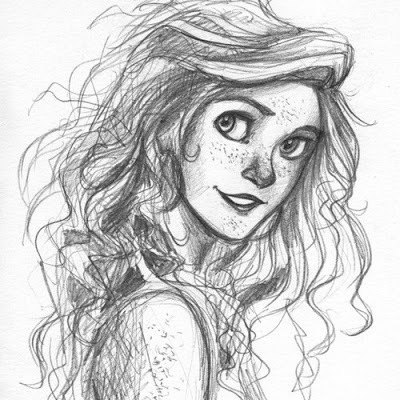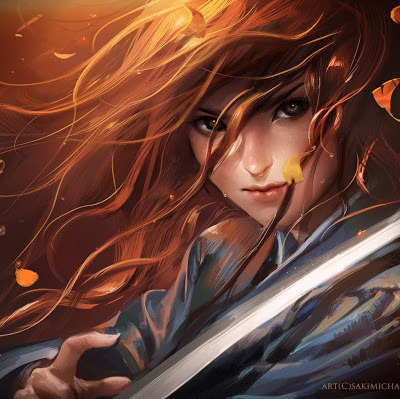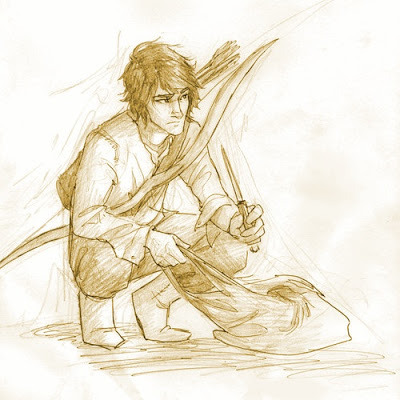Jennifer Freitag's Blog, page 30
December 8, 2012
H - Horseshoe Place
 The last A-Z post I did for Adamantine was all the way back in October, concerning the
Ghiraranna
. I'm currently in the midst of tinkering with a few edits for Adamantine, recovering from the month-long dash to reach another 50,000 words on Plenilune, and quietly brainstorming for Gingerune. So I have all three novels on the brain (which is not very surprising, I know - what else occupies my imagination?), so the topic for today's A-Z post in refreshing.
The last A-Z post I did for Adamantine was all the way back in October, concerning the
Ghiraranna
. I'm currently in the midst of tinkering with a few edits for Adamantine, recovering from the month-long dash to reach another 50,000 words on Plenilune, and quietly brainstorming for Gingerune. So I have all three novels on the brain (which is not very surprising, I know - what else occupies my imagination?), so the topic for today's A-Z post in refreshing. “I suppose it’s not really my business,” the lad broke into her thoughts, “but is it a nice sort of love you’re in?”
She shook her head to clear it. “I’m not—in love,” she said, blushing. “I was just thinking how nice your farm is. It is a very lovely piece of land.”
The lad nodded, shoving his hands into his work-clothes in a careless gesture. For a moment he regarded Andor askance, who sat patiently gazing up at him, hoping for a pat. “Aye. It is a good sort of love, then. An’ it is a good place,” he agreed: “an horseshoe place.”
Her mouth twitched. “Yes.”
Adamantine
Here's another theme that runs not only through all three novels (in varying degrees) but also through my life: the sense of belonging: the sense of a place reaching out and pulling you in and loving you as fiercely as you love it. There are a lot of novels written about people trying to find their place in the world (whatever world that may be, this one or the next one, or one completely imagination), and we're all acquainted with that painful story of rebirth as a character grows into himself. What we don't often see is the world growing into the character, of the world finding a weak point in the character's armour, of flying through the chink and stabbing him through the heart and never leaving off that acute and loving pain of ownership. A world like that of Faerie, weird and wild and totally foreign to our determined but naive heroine, while trodding on her skirts and catching her up with danger at every turn on the one hand, on the other steals over her heart with a sense of the anguished slavery of love. Her tenderhearted nature answers to the land with a sense of belonging and being owned and the whole land takes on for her - as it has taken on for me - an image of grace. A living genius. A canny place.
a horseshoe place
Published on December 08, 2012 12:55
December 5, 2012
Giveaway Winners Announced
 As promised, today is the day to announce the winners of the November Blog Party Giveaway. To reiterate:
As promised, today is the day to announce the winners of the November Blog Party Giveaway. To reiterate:There will be TWO winnersand
Each winner will receive a copy of BOTH The Shadow Things and The Soldier's Cross.
Cool deal? Abigail and I drew lots, I got thrown overboard and was swallowed by a big fish, and the winners of our giveaway are
Lynette and Elizabeth Rose!
Congratulations, girls! I'll be emailing Elizabeth Rose (since I can't remember your address and I think I deleted that email) and Abigail will in some way (possibly by carrier pigeon) be getting a hold of Lynette, so that we can get your addresses and ship your autographed books your way! Thanks for participating, everyone! Deo volente, we'll be doing more giveaways in the future.
Published on December 05, 2012 12:11
December 3, 2012
The Fool Among the Gold
 "And so you came, as you are always wont to come, when you are most needed."fitzdraco
"And so you came, as you are always wont to come, when you are most needed."fitzdracoDue to my overachieving speed with which I tore through NaNoWriMo, right about the beginning of the second week of November I had it in my mind that November was over and it was surely now December; by the middle of week two I was thinking seriously about Christmas. Writing will really mess with your perception of time.
But it is December now and our month-long blog party with all you cheeky folk and our novels has come to an end. It was a lot of fun, judging from your comments you all enjoyed it, and I do want to thank all of you who shouted it out and also hosted both Abigail and me on your blogs. Your support means a lot! Abigail and I should have the winners of the giveaway up no later than Wednesday, December 5th, so keep an eye out!
And now, out of the enormous chaos of literature I have slashed and punched and shattered off the annoyingly immovable bulk of my stubborn and embittered genius, I give you snippets. Gee golly, I've earned a snippets post.
NaNoWriMo Snip-Whippets
"I could take his head between my hands and crush his skull."Plenilune
Everyone’s head was up and all eyes were on Skander and poor Periot, save Rupert’s—he lounged panther-like on his log, staring into the heart of the fire: a smile slunk across his face. She did not know why she did it—the blood rang so loudly in her ears that she could barely hear herself and she had the feeling of being disconnected from herself by a sharp blade of terror.Plenilune
He pulled off his cloak and took his things into the adjoining bedroom to unpack. “Spencer!” he called back. “Would you bring a light? It is black as pitch in here.”Hesitating in the dark doorway of her own little room, Margaret looked back: in the shadows of the other room she could see [him] moving about—a great distance off, it seemed just then—and suddenly she hurt for him and could not move, for to move would make the pain only worse.Plenilune
"It is God's own ink the devil writes."Plenilune
“Honesty is the greatest of our misfortunes, and caring second greatest.” Plenilune
Rupert’s face turned white and Margaret felt the air grow thin. Had he been any other man, he might have brushed the mockery off—had it been any other mockery, he would have. But one thing that Margaret could say for Rupert was that he took his love and hatred seriously and did not cover them in laughter. She could almost hear the sheath of his patience clatter to the floor as he removed it.“By his Infernal Majesty and my Lord Adam,” he breathed—the glass pane behind him splintered with a hundred spider-fine cracks— “take back your words, or I’ll put them back.”Plenilune
What did she want? she asked herself with a sudden unkind fierceness. To tidy the place like a nursery, free of any sharp objects that might hurt someone, to be sure of a happy outcome like a little girl reading a fairytale? But that was not what had at first repulsed her from these people, and what had eventually drawn her. With their thin skins, quick to take offence and to defend their bantam plumage, these were men who lived among danger and swords and blood and put a great price on honour. They had not turned their world into a nursery. They loved their world fiercely and their world loved them still more fiercely back—the high winds of the fells rushed at that moment around Lookinglass, thrumming ominously in the walls. Plenilune
"I'm afraid this is a problem that will not go away with the shooing of it." Plenilune
He got up; he was taller even than she; she had the impression of some Egyptian obelisk—a totem of a death religion—being raised in her face, its cold cultic shadow making her pupils jump wide open in her eyes. Plenilune
After a pause, Rupert reached up and jerked the chin-strap free on his helm and slung it off to rest it on his knee; his face, now bared, was at once grim and handsome; his brow was silvered and sanguine where the rim of his helm had left a weal and the sweat had pooled in the depression. Plenilune
“He shows signs of pride even now.”“A congenital trait of humanity,” said Margaret, goaded by a spasm of philosophy. Plenilune
“Do we lie when we are only human, and not gods, and bear ourselves up on a thrill of greatness? And what are humans, after all? Should we consider ourselves thoroughly cheated if we happen to find a little of the fool among the gold?”Plenilune
But Margaret was left standing, stunned, in the middle of the floor; in that unguarded remark she found herself facing the vivid scene of her last night in Marenové with its whirl of lanternlight and Rupert’s face, forever fixed before her in a kind of wretched, golden horror, looking back at her with the expression of one riven to the heart.Plenilune
"Best not kick over this bee-skep, sirrah." Plenilune
Published on December 03, 2012 05:30
November 26, 2012
Pertinent Questions With Impertinent Answers
 "Is everything a joke to you?""Uh, only the funny things."The Avengers
"Is everything a joke to you?""Uh, only the funny things."The Avengers The following are the questions which Bree (of Tea and Bree) sent in for the party and the benefit of you all. They were very good questions, but I never promised an absence of drollery.
1. What inspired you to write The Shadow Things?I was partially inspired by the little novel Sun Horse, Moon Horse, a heart-wrenching and beautiful story, but also by an annoyance with people who, having become Christians, are prickly and discontented with their lot. We all know that story. Many of us live that story. So what does it look like to have a person contented and growing in righteousness despite all circumstances attempting to invoke the opposite? What do fortitude and patience, faith and peace look like? In The Shadow Things I attempted to sketch a picture of those virtues in the lives of a few otherwise insignificant people whose “footsteps yet remaining do testify that they were indeed holy men who, fighting so valiantly, trod the world under their feet.”
2. What was the first feeling you felt when you found out The Shadow Things was accepted, and going to be published?I was so floored that for a time I refused everythin3. How much time daily do you spend writing?I don’t write every day (though a day doesn’t pass when I’m not thinking about one or several of my novels) but when I do I spend four hours, twenty-two minutes, and five seconds writing…
4. How long did it take you to write The Shadow Things? I tend to say it took around two years. It is not a big book (it surprises me how quickly people tear through it), but then it was my first serious novel; though I had learned how to write before that, I had yet to learn on The Shadow Things how to scrub off a novel and make it thoroughly presentable, and of course that takes a little time. I’m told I was made to rewrite quite a bit of it at one point, and the person who claims to have told me to do so keeps apologizing to me for it, but I don’t actually remember any of that happening so I suppose I have forgiven her…
5. Could you be persuaded to share a snippet of one of your first written works of literature, unedited? Let me think… No.
ARE YOU NOT ENTERTAINED!
Published on November 26, 2012 05:22
November 21, 2012
A Question For Each Freckle

I was tagged by two separate people to receive the Liebster Blog Award, once by Rebelise of Rebecca's Pen, and once by Katiebug. I am not going to follow the normal rules (I'm really quite dreadful when it comes to that sort of thing) but I am going to answer their questions for you as they fit so nicely into the vein of my blog party! All of my stories, including The Shadow Things, managed to worm their way into these answers. They have a way of doing that.
Rebelise's Questions
1. L.M. Montgomery or Louisa May Alcott?
Ooh, aah… Gee, I feel like a minority under the acute blaze of this question. To be honest, neither. Montgomery’s Anne Shirley stories were certainly amusing at times (I would sometimes catch snippets while my sister-in-law read them aloud to Abigail in some years past) but I only read Anne of Green Gables and I was never much motivated to read anything else. The same goes for Alcott, except that I didn’t like the one book I read (Little Women) and I did enjoy Anne of Green Gables. In the defence of Little Women, I have to say that I did read it for school and, in the defence of Little Women, looking at my bookshelf, I see I do not often read books with women as the main characters…
2. Do you listen to music while writing? If so, how important is music to your writing process? Do you do anything special to integrate music into your story-writing?
Usually I do. Depending on how diligent I feel (or how focused) music may or may not be superfluous to keep me on track; sometimes sifting through my brain and hunting down songs on YouTube proves very distracting and I will often fix upon a single song and hit “repeat” all day long while I work. The type of music is not always important; whatever it is, its basic function is to create a sound barrier between myself and the rest of the world so that I stay cocooned inside my task. You can see I have thought about this.
3. If you could have one of your original characters meet a character from your favorite book, which would these characters be?
Ooh, now, there’s an interesting question… I have got to the point at which I no longer have favourite books. There are too many good books—I can no longer call one my favourite. But…that’s dashed hard! Perhaps Rhodri from my book Adamantine and Simon from the novel of the same name. They may be quiet and grey-coloured enough not to spook each other out of a conversation.
4. What is your biggest crush on a fictional character, if you ever had one?
I’ve never had crushes, but I have always had a deep attachment to Justin of The Silver Branch, for he is such a sweet, intuitive fellow. I have a great admiration for a dozen other characters, but Justin has always been sweet and kindly, a little stubborn, good-hearted, and loyal, and I put a high price on those qualities.
5. If you were writing a historical fiction novel, what time period would you choose for the setting? Why would you choose that time period?
Well, I did. I chose insular, post-Roman Britain. I say post-Roman; it was still rather Roman, for it clung to its Roman roots as long as the spark glowed, but the Western Empire had effectively crumbled and Rome had made it quite clear that Britain’s petitions for aid could no longer be answered. Why I chose that time period, especially since these great facts of history are essentially unimportant to the story, I cannot tell you. It was the time period that the story chose, and I wrote it that way.
6. Would you want your story illustrated? If so, what kind of artistic style would you prefer? (manga, traditional, cartoonish, sketchy . . .?)
No, I don’t think so. I think it would be neat to have a cover by Sakimichan, whose art is very vibrant (though I cannot, in good conscience, say I like all the pieces), and as I get the impression from other people’s impressions that my writing is also vibrant, those seem to work well together.
7. What is the biggest distraction for you while writing?
Myself. Once I get going I am usually a good little engine, but buckling down and overcoming the inertia is often difficult, and as I am the Engineer-in-Chief who oversaw the laying of the Path of Least Resistance, I will often amuse myself in other ways before I finally get down to business. To defeat the Huns.
I had to say it.
8. If you have done or are currently doing NaNoWriMo, how do you set aside the entire month of November for writing?
I am, and I don’t. NaNo isn’t so much about shunting work out of the way to tackle writing as it is learning a precise balance so that everything, including your writing, is accomplished. My sister does this best—she also has a fuller plate than I do and a disposition naturally attuned to balance—but I have a home with cleaning, laundry, and meals to attend to, without which life will suffer greatly, so I have to learn balance. It really is not that hard, you just have to remain diligent.
9. What are your thoughts on college as a writer? Do you view college positively, or as a hindrance to a writer?
For myself, I could not qualify how bad college would be for my writing. I think it might be akin to Mr. Murdstone putting Clara in a cage and breaking her spirit. That sort of thing. Or Ginger—poor Ginger!—of Black Beauty. I need vent for fire and spice and “scope for the imagination.” I am acquainted with how little scope college wants to allow you.
10. If you had to choose, would you emulate from Charles Dickens’ writing style, or from George Eliot’s? Explain your choice.
Neither. And I will direct you to this post to read my explanation.
11. What do people in your life think of you writing? Do they approve, or do they think you’re strange?
A good bit of both, I imagine. Everyone has read The Shadow Things and most have read my latest manuscript of Adamantine—Plenilune is not fit for anyone’s eyes yet—so they have a good idea of my style and what I am capable of (digging people’s hearts out with spoons) and they seem to enjoy it. I think it would be naïve to say someone with as many characters, plots, landscapes and emotions embroiled in a constant war in the brain could be anything but a little strange.
Katiebug's Questions
1. Do you outline before starting a novel? If so, how extensive an outline do you create?
I don’t. I did outline for The Shadow Things, which did help, but I found it left me with a bare-bones story and I had to go back in and flesh it out anyway. I tend to have a general idea of where I am going, but my writing is very organic and grows and develops in itself as I go, which a rigid adherence to an outline would not allow.
2. Do you profile your characters to flesh them out and make them as realistic as possible? If so, would you share the template or basic outline you use?
Actually, I don’t. (My word, I'm so negative!) Again, like my plots, my characters tend to be organic and often very Athenian. I may use Beautiful People to explore them, but the characters themselves usually drop like a thunderbolt out of the air, fully formed and complete with their own personalities. It is no more different, really, than meeting a person on the street—except that you know more about the character before the first meeting than you do about the stranger on the sidewalk.
3. Do you force yourself to finish a writing project before starting on a new one?
In a broad sense, yes. I haven’t seriously begun Gingerune yet because I am still thigh-deep in the bloody muck of Plenilune—like Christian in the slough, the more I struggle for the shore, the more Plenilune sucks me in. And anyway, I wouldn’t be able to do either plot justice if I tried to focus on both seriously at a time. As ideas come to me, I will write them down, but for now it is just Plenilune.
4. HOW IN THE WORLD DO YOU CONTROL THE PLOT-BUNNIES?!
I don’t have many of them! Honestly, I don’t. I may have little one-shots that I will scribble when I ought to be scribbling something else, but at present I have an orderly bunch: Adamantine, finished and pacing in the paddock, Plenilune, which I am still trying to get the mastery of and which seems to be getting the mastery of me, Gingerune, rather more spirit at present than anything with a body I can put a bridle on, and Between Earth and Sky, which has been let out to grass for so long it has become placid and fat and will gladly wait a little longer even though I love the beastie and am anxious to get back to it. But they are all pretty polite fellows and wait their turn; it helps that I usually get so deeply entrenched in a single story that to work on it is enough to satisfy my creative genius.
5. Once in a while, we all write characters that scare us for one reason or other. How do you deal with these characters and the emotions they evoke in you?
So far my only difficulty with being “afraid” of a character is being afraid I will not write him properly. They come to me to be written, I don’t usually go to write them, and some of them are so awful or so splendid that I wonder, “Can I possibly capture the soul of this character and do it justice?” It can be frightening, but so far, somehow, I have managed it, so I try to trust to my own skills and run forward helter-skelter, hoping I won’t fall on my face. As for the truly frightening characters, I always feel a sense of dark success when I write them, for to get the ring of evil as truly as the ring of goodness is equally important for a storyteller; I am never afraid of them, but once in a while, when one of them—the pooka, perhaps, or Rupert de la Mare—cut cleanly with the grain of evil, I sit back and revel a little in my vessel of dishonour which I have made.
6. Bronte sisters or Jane Austen?
I can’t fairly answer this, Katiebug! I haven’t read any of the Brontes yet, though I have read Austen.
7. Peeta or Gale? (This has everything to do with everything.)
Does it? I am sure they are both very nice people in their own way—(“Yes, but what kind of people…?”)—though I couldn’t say as I have met neither of them. (Run—run away from this question!)
8. Do you people-watch? Do you find this inspires you to create more relatable, three-dimensional characters based on your observations?
I don’t. I know Rachel does it, and does it well, but I don’t really like watching people—they can be very scary—and I’m a bit daft when it comes to picking up on mannerisms and suchlike. I’m an intuitive learner: much of what I get goes into my subconscious to be sifted out later and probably at the most inconvenient time.
9. Do you write best when warm and cosy indoors, or outdoors with the sun in your face and the wind in your hair?
Oh, I like the wind and the suchlike, but there is too much scope for the imagination out-of-doors. You try rounding up your mind when it has so much wideopeneness to run away in. There is absolutely no barrier between myself and everything else outside. I need to be put in my little corner with my scores of sticky-note notations, a cup of tea and a strain of music, and then—and often only then—can I go into that odd trance which is writing.
Published on November 21, 2012 07:10
November 19, 2012
Here There Be Humans
 Merlin: "Great legends were made here."Arthur: "With you as the hero?"Merlin: "Of course."The Last Legion
Merlin: "Great legends were made here."Arthur: "With you as the hero?"Merlin: "Of course."The Last LegionArthur and his knights are referred to as the Matter of Britain, and Charlemagne, with his men and their stories, is called the Matter of France. What they have in common are that they are populated with heroic men (grown into something like gods with the passage and distance of great time), and that they are beautifully limned illustrations in the long and on-going epic tale which is the Matter of Earth.
...whatever the size or anthropomorphisms of the dragon, it is not the dragon - never the dragon - that fascinates. The dragon draws the edge of the shadow of truth the tale tells, but it is the man who is most fantastical.
When we read Chesterton's account of King Alfred (standing here in stead of Arthur) in The Ballad of the White Horse, or of Charlemagne and Roland, we are not so fixated on the overwhelming Saxons or the invading, seemingly unstoppable Muslim armies as we are on the staunch demeanour of the heroes - afflicted in every way, but not crushed; perplexed, but not despairing; persecuted, but not forsaken; struck down, but not destroyed. When something so obviously fantastical as Bard the Guardsman stands forth in the midst of rack and ruin and fires off one arrow of faith we are struck, not by the thundering pressure of air and the sparks floating on the wind with the imminence of the dragon, but by the sudden shining beauty of the simple Man.
This is the Matter of Earth: the story of man's war to win himself back from beneath the dragon's foot and to set his foot on the neck of the dragon. We have all read the story of our Champion, our Arthur, our Charlemagne, our Christ. We aren't struck so much by the conspiring groups of men and angels gathering about our Lord throughout the story, searching, waiting for an opportune time at which point they would strike him down. Our attention is held by the Man Himself, a Man acquainted with grief, a Man of passion, a Man of tenderness, a Man in whose hands was healing and in whose tongue was a biting sword. We are astonished, not by the supernatural characters, not by the odds, not by the circumstances that surround him - we are astonished, among all this, to find, very simply, a Man.
When I read Anna's post on uninteresting things and uninterested people I told her at once that I must write a companion post to it. Over a month later, I am doing so now. I want to bring it home to you, with as smart and clear a ring as I can strike with my own martel, that all you find fantastic in the genre fantasy is but the setting and the backdrop, the stage design, for the really fantastic figure: man. What is more astonishing in Chesterton's story of Alfred than the stinging rebuke: "But upon you is fallen the shadow - and not upon the Name; for though we scatter and though we fly, and you hang over us like the sky, you are more tired of victory than we are tired of shame"? What is more astonishing in the story of the man and the dragon than that the man puts his heel on the neck of the dragon and cracks it? We read a story in which a man is overcome by death - that most inexorable of enemies - and death itself is overcome by him, and we are not surprised on death's part, but on the part of the man.
Anna is right: the genre of fantasy lacks much of its power because it often leans on the broken reed of imaginary creatures, forgetting that the real spotlight is on the unimaginably fantastic figure of man. That mind so quick and cunning, that psyche so capable of both power and compassion, a will of dominion and tenderness, a creative spirit like that of our God, quickly outshines the wit of the brightest Sphinx, outstrips the splendour of the fairest Bird of Paradise. The gleam was in the feat of Hercules, not in the golden skin of the apples.
Which is why Plenilune, as I half-lamented, half-crowed, is so full of show-stealers. The point is not so much the fantastic backdrop of its world (nor the world of Adamantine, nor that of Gingerune), but the feet of the humans in those stories, beautiful feet upon the mountains, coming down with a blow to rock the worlds to their cores. The point is not to throw some relatable characters in amongst a strange, alien world, but to bring the surprisingly alien spirit of man out in stark relief and to show you that this is where the real fantasy lies, this is the true source of life's wonderment, this is the Matter of Earth.
do you remember when we wentunder a dragon moon,and 'mid volcanic tints of nightwalked where they fought the unknown fightand saw black trees on the battle-height,black thorn on Ethandune?
Published on November 19, 2012 12:53
November 17, 2012
The Fear of Failing
 No half-heartedness and no worldly fear must turn us aside from following the light unflinchingly.J.R.R. Tolkien
No half-heartedness and no worldly fear must turn us aside from following the light unflinchingly.J.R.R. TolkienIn the course of my taking questions for the birthday party here on The Penslayer, I was asked by the blogger of Fullness of Joy the rather enormous question of how I (or anyone, for that matter) go about presenting the Gospel in an historical fictional setting. My answer is somewhat lengthy (it's a big question!) but hopefully worth the reading, so check it out here!
Emily sent in the following, poignant question. Read it and think about it! I have done my best to give an adequate answer to a difficult obstacle.
Often I get this fear that the words will not come out as well as I feel in my head and my heart. How do you recommend overcoming that fear?I think many of us struggle with this emotion: the fear of failing. The idyllic but formless sense of a story which we get inside our heads is an ethereal thing, such stuff as dreams are made of, and dreams do not suffer to be caught in cold stone and dried ink. The stuff of dreams, and ink and stone, are separate mediums, completely different, and you cannot make a dream out of stone, nor ink out of a dream. Something will always be lost in translation. The dream in our head will never be the image on the page.
I don’t want to discredit this fear or, in a sense, displace it. It is a healthy fear in so far that it does not keep us from our work. The fear that you might not do your dream justice, that your characters will be flat and not full of dimension as they are in your head, the fear that you might let the readers down, lends a serious edge to our work and drives us to do better, to try harder. It inspires us to greatness for, looking on failure, we appreciate that we cannot let ourselves do badly. This fear has its place. This fear has its purpose. It is the sensible recognition that what we are doing is important and that we cannot afford to ruin it. All those who feel this fear, I commend you.
But how do you move on through the fear? How do you not let it cripple you? It is no great feat of magic: you simply push on. No one plays an instrument to match the music in the mind until many years of practice have been put in. The sorry scratchings and scribblings that you make at first do not prove that you are a bad writer, only that you are a young one. Persistence, diligence, and a teachable spirit will give you growing deftness with your craft. Keep the healthy fear—it makes you humble—and to it add an even greater measure of simple, quiet discipline: as times goes on and you grow more skilled with words, the translation from dream to word-picture will grow easier and clearer and you will begin to say more and more what you mean. And always remember: there is no praise for someone who felt fear and gave in to it, but great honour for the soul who, enduring great fear, went on in spite of it.
Published on November 17, 2012 06:33
November 15, 2012
Beautiful People - Huw Daggerman

“You have a sir’s way about your speech. Art handy with a weapon?”“Oh, fair to middling, my lord, but I can take a blow.”Plenilune
I had forecasted the secondary character Huw Daggerman since ages past and, like most characters I have not yet written, he had a vague but sensible appearance and a touch of personality. I had some misgivings: what is his purpose, where is he from, why am I allowing this character to brutally shoulder his way into my story at all? I already knew his vocation and what work I would put him to later, but the fact remained that he was just a secondary - almost a tertiary - character. I should probably resist allowing him in. But the damage is done (for better or worse, probably worse) and I'm not altogether keen on the notion that all characters have to have a clear purpose in the plot: life itself isn't that way, and the characters who move even on the outskirts of the plot have just as weighty an importance of being as the characters in the foreground. So I let him come on.
Unfortunately, the moment I began to write him (which was only a few days ago), he ditched the vague impression I had of him and made a lunge for the spot-light. In my head, at the back where it is grey and gloomy and full of cobwebs, he was a middle-aged, rough-and-tumble man with a short, bulky figure and a profession of taking things which weren't his. He kept the profession, but as I began to write him I found my fingers obedient to another image: still middle-aged, a spry and healthy forty or so, dark hair that has long since begun to grey, with a rough but pleasant face that prefers being amiable but has had a hard life. His originally caustic undertones became tinged with a sense of self-sufficiency and pride, his face (before a little unlovely) became both assured of its relative desirability and genuinely friendly. (I find the latter trait incongruous because he is not fond of people, but then the human soul is amply capable of incongruities.) His ego, turning out to be much bigger than I had anticipated, is proving difficult to shove into the backdrop. As my husband remarked dryly, "Plenilune is full of show-stealers."
How these men were defined by their glories and their insults!
Where is he from? You know, I actually don’t know. I suppose if I troubled to ask him he could tell me, but the man is anything but landed and he moves about so much that having an origin has never struck him as being important. He finds people’s pride in their countries an interesting phenomenon, but not one that he shares or wants to share. It makes life inconvenient sometimes.
Does he have a life verse? If so, what is it? There is an old nursery rhyme—so old it is almost universal—a bit of which goes:
Pipe clean away the azure blood,Pipe away the fame;Pipe away the laddie’s youthAnd the beauty of the dame.Pipe to the old macabre dance—It’s all a-one to me.Birth is had with a hefty priceBut death we have for free.
How did he do in school, and what sort of education did he have? “He is the natural son of NObody knows who—” He never really attended school. Between the ages of nine and ten he was put in a country school where he got a rough acquaintance with his letters, but that spurted and fizzled out quickly and he never progressed beyond that. He is by no means a dullard, however: he is a fast learner and a very keen student of anthropology and the human condition. His natural disposition runs readily in the direction of pleases and thank-yous, but experience (oftentimes a pessimistic teacher) has given him a cynical side which has kept his neck out of the hemp halter yet.
Does he have an accent? What his native accent might be, I don’t know. Typically among the lower classes the brogues are thick with thees and thous, ests and eths, but Huw Daggerman (in his free-from-the-schoolhouse way) has risen above that and speaks in a very clear, autocratic language. He may or may not have cheated the hangman of the boots he is wearing, but he strikes you on first acquaintance as being a well-bred (if poor and unfortunate) gentleman.
Is he more introspective or does he talk aloud? Neither. He does tend to internalize, as he does not have any friends to which he can open up, but he can also be very impulsive: a defect he is trying to remedy and could also be checked by a possession of friends. The two things he is clear on are that life is very harsh and empty and never keeps its promises (unless that promise is an assurance to let you down) and the fact that he is, to be honest, very lonely.
But you wouldn’t guess it for his smile.
Has he ever been in love? That depends on your definition of love. Let us say that the man gets around, as it were, and that his morals are perhaps not as rigid as those of other characters in Plenilune.
What would his reaction be if he discovered he was dying? It is a combination of extreme fear—because he has been running two steps ahead of death all his life and it is always breathing coldly down his neck—and resignation—because he has seen humanity fight with death and always lose. He is not nihilistic. He does believe there is something beyond death, but judging from people’s innate fear to approach death and whatever lies beyond it, he has concluded that it is a dreadful and inevitable evil and one can only square one’s shoulders like a man and hope to “whatever gods there be” that one’s lip does not tremble at the last moment.
Does he have simple pleasures or does he have elaborate dreams for the future? For what he does, Huw is very sanguine about living a simple life, as comfortable as is necessary; he is quite of the school of thought which admits that you can’t take it with you, but he also doesn’t buy into the notion that we should eat, drink, and be merry, for it is as bad for the mind, in his opinion, as unhealthy living is bad for the blood.
Describe this character in three words. Attractive. Amiable. Agnostic.
Published on November 15, 2012 11:58
November 12, 2012
Art and Marketing

Conversely, however, the children of legality are shocked by the resolute refusal of the children of light to insist on this kind of claim and—still more disconcertingly—by their angry assertion of love’s right to self-sacrifice. Those, for example, who obligingly inform creative artists of methods by which (with a little corrupting of their creative powers) they could make more money, are often very excusably shocked by the fury with which they are sent about their business.
Dorothy Sayers, The Mind of the Maker
Art and the business of art. It may not be a hard leap for you to make if I propose to you that art is the language of love. Of course I do not mean merely sculpture and painting, or even writing. By “art” you may understand me to mean what others mean when, addressed about a certain activity in their lives, they reply, “Oh yes, I make an art of it.” But what do they mean by “art”? What is their innate creative power doing through their active will with that particular activity? You can assume they enjoy it, if they are not being sarcastic (and the sarcasm only highlights the positive by way of a negative). They so enjoy the activity, they so love it, that they put all their creative power into making an art of it. Art, the husbandry of creation, is the expression of love in the creator (be it God or man) through the act of ordering and in the finished act of having ordered.
This is pretty easy to swallow. You all know what it is like to be charged with the desire to create, to be in the pangs of jealous love for the story inside your head, to, through an agony only you can know and cannot quite express, draw it line by bloodied line out of your mind into a material form of existence. The very first picture we get of God is that of him creating: it follows naturally that man, made in the image of that God, should have it in his nature to create. He can’t not. He goes mad or becomes a drudge otherwise, something almost less than human, very less than God.
Once you put the pieces together in a line like this, this is easy to see—and it’s a really pretty picture. But we don’t live in Utopia: we live in a world of communism and capitalism, each on rickety stilts, neither of them giving a good answer to the world; we live in a world in which money is shuttled to and fro and people have to make a living. We live in a world where, very often, our art has to work for us. At first glance the artist, understandably, recoils in disgust. It is a degradation to lower the fire of his genius to the household hearth. His imagination is holier than that. The images and people in his head (though inspired by earth and the things of earth) cannot be sold for a price. You probably sympathize with this artist. In a way, I do too. There was a time when I sympathized powerfully and my reaction to the ideas of marketing, honest or otherwise, was as violent as the reaction in the excerpt I shared from Sayers’ The Mind of the Maker. But again we are missing an important detail—or two.
The first is easy to accept: we have to eat to live, and to eat we have to buy food, and to buy food we have to make money. This is a simple, unavoidable fact of life. The second detail is more complicated and should be appreciated by even those who are not in a position to have to make their art work for them. In the beginning God made everything as an artist makes a work of art. But unlike painters and sculptors (and a bit more like writers) God made his work of art capable itself of work. He stitched his own act of work into the fabric of our nature: he worked six days and rested on the seventh, and the inexorable word of his power bade us do likewise. His art works for him. His art is not a picture hung on a wall in heaven, immobile, inflexible: like a mighty story in the brain of a writer, wholly dependent on that brain yet, in its way, independent of all other life, God’s art lives and moves and has the task of accounting for its own orderliness. In short, even the greatest and first of all creators made his art work. Are we so high and mighty that we can’t do that ourselves?
Yes, that is what I thought once. And before you think I have sacrificed some of my integrity to the god of marketing, I assure you, I haven’t. I’m as cynical as the next person driving down the road, pointing out the fallacies in the ideas behind billboard advertisements. Most of them are overcooked and very fishy, and the meat flakes off easily when you pry at them with a fork. You don’t have to sell your soul to sell your book. Jesus himself made that stinging indictment, “the sons of this age are more shrewd in relation to their own kind than the sons of light.” (Go read that passage—Luke 16:1-12—because it’s really interesting!)
So what did I do? You’re looking at it! With very little experience in how to use the internet for your own ends (other than the dubious site Wikipedia), I launched The Penslayer in an attempt to carve a niche for myself in the writing world. This kind of thing takes time and learning, of course, but I did it. And look where I am, two years later: not a shabby place. I now have a Facebook page, a Twitter account, I’ve done book-signings and interviews and I’ve even been on television! When The Shadow Things came out in 2010 I went through an emergency growth-spurt which was, admittedly, a little painful, but I did it and I’ve learned that I can do a lot if I have to. I can hunt down avenues to market my book, I can ferret out ways to get the book out there, and I’m actually doing the book a favour. It is an unfulfilled work of art sitting on my shelf with no one to enjoy it. It needs the reading populace. That is what a book is meant for: to be read.
And I still have my soul.
(For an additional perspective on how to market and be honest with your art, read Stephanie Morrill’s The Hunger Games and Marketing Your Novel.)
Published on November 12, 2012 06:55
November 8, 2012
Scrambled Like An Egg
 Questions! Questions which have less to do with me in relation to The Shadow Things and more about me as an author in general. If you can have such a thing as "an author in general." Which I doubt. These are from Mirriam! Leave it to Mirriam to come up with the kooky ones. I love that she does that. You've got to have some kook.
Questions! Questions which have less to do with me in relation to The Shadow Things and more about me as an author in general. If you can have such a thing as "an author in general." Which I doubt. These are from Mirriam! Leave it to Mirriam to come up with the kooky ones. I love that she does that. You've got to have some kook. What is your workspace like?
“I like your clothes-line,” said Anna as she took stock of my spare room. “Oh, yes!” I replied a little awkwardly (as if it were not obvious and as if I had forgot the clothes-line was there) not sure if I should expound upon my methods of keeping notation or if my methods spoke for themselves.
My workspace is the spare room. I do not say in the spare room, it really isthe spare room, for my work seems to flow out from me like a bride’s enormous wedding skirt—and as comparably deadly to innocent passers-by. I have a roughly gibbous-shaped computer desk, complete with a mobile keyboard shelf (very handy); I push Jefferies’ screen to the back edge of the desk and leave what is not otherwise occupied by the router and speakers open to clutter from the mouse, my slips of note paper, my journals, pens, oddment candles and jewellery, and an impressive shrine to tea mugs.
To the right of my computer chair is a matching chair I employ as another table (all flat surfaces will be requisitioned as a table), and over it I have hung my cork-board (covered over in scraps of notation for Adamantine, Plenilune, Gingerune, and Between Earth and Sky, a map of England that has seen better days and darker places, passport photographs, a pretty snapshot of the girl who remarked on my clothes-line, and an ominous poster declaring in bold font NO ONE PROVOKES ME WITH IMPUNITY). I keep portraits of my Adamantine cast above and around it. Eikin looks down at me knowingly…
The left-hand wall is protected by a sea chest (which you can barely make out, as it is swamped in a lamp, a tea pot, Chesterton, and papers), a window (a window?), more pasted notations, the map out of The Eagle of the Ninth, a painting of Bagheera, a chart of linguistics for the Indo-European languages (ehwot?), and sports the fabled clothes-line strung from the end of one single mounted shelf at one end of the wall to a single mounted shelf at the other end, from which line I dangle more notations that don’t fit on the walls. The double bed acts as yet another table when Abigail isn’t sleeping in it (even then I’m not sure she always digs out all the books before she falls asleep), and the wall above the bed sports the most concentrated menagerie of my Plenilune notations divvied up by Honour. And then there’s a bookcase. Full of books. And an awkward closet with those dreadful folding partition doors in which I keep all my Christmas stuff. And a table that used to be our dining room table but got demoted to Another Table for the Spare Room. Oh. I seem to keep a copy of Webster’s dictionary, a Scots-English dictionary, and Athanasius under my computer desk. And there’s a cat on my lap. Point of interest: I keep a masque that I bought in Charleston on a mannequin head on the top of my bookshelf. Cool stuff.
Do you have any writing idiosyncrasies?
I don’t write well in notebooks. I don’t even write very well on my laptop. I write best on my desk-mount Jefferies, whom I have had for years and who has been a very loyal, healthy fellow. If I have not “put myself together”—dressed, brushed, put on my make up—I cannot think clearly enough to write anything decent (usually I can’t think enough to doanything decent). I prefer to have something to drink while I am working. I don’t have to worry about dehydration because, so long as I have a cup of water or a mug of tea handy on the desk, I will drink it mechanically as I work. Not having a glass around peeves me and cramps my style. (I have been known to nearly take a swig from an old, forgotten mug of tea before catching myself. Yewwah…) I’m sure I make faces, I pace when I get excited, and I am almost always listening to some music while I work.
Do you have favourite songs you listen to while writing?
Oh, any old thing that catches my fancy will do. I can listen to a single song all day if I like it enough. I usually do. Lately I’ve been listening to "Sho's Song" from the film "The Secret World of Arrietty" and Andrew Peterson’s “Matthew’s Begats;” before that it was the handful of Jim Croce songs I have on my computer; several Shearwater songs work wonderfully for Plenilune, the credits theme for the 1995 version of “Kidnapped” is especially stirring (if regretfully short), and a bit of Owl City, though not typically in line with my novels, is heart-warming when the work is going hard.
How long does it generally take for you to write a first draft?
There is no generally. It took me about two years to write The Shadow Things completely, all drafts included; it took me about five years to write Adamantine (but only because I was young and wandering and still learning my trade); I am about halfway through the first draft of Pleniluneand it has only been a year. And a NaNo. So…no generally.
What sort of character is your favourite?
Oh boy. I think my favourite woman might be someone like, oh, Aunt Honoria, or Lady Prezmyra, or Lady Mevrian—are you allowed to have two you like from the same book?—the sort that reminds you of Athena: “stone-stern and shrouded in black and gold.” Turning the tables, the men I like are often small in stature, or lean—they don’t look like Thor, and they often rely more on wit and charm and manners than their fists. Some of them combine brains and brawn, but I like fellows like Howl and Gro, which answers the next question…
What is your favourite character you've created so far? Why?
It is a friendly tie between Rhodri of Adamantine and the fox of Plenilune, for those very reasons I stated above. The one relies on wit almost alone and does not have enough stature for brawn; the other, in his charming, unassuming form, packs a punch and his wit, while sharp, looks to the untrained eye to be far-flung, wandering, and at times scrambled like an egg. I love them both to death and to discover them has been a treasure.
does it show...?
Published on November 08, 2012 05:34



